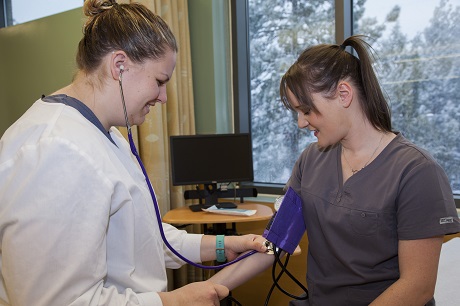The many hats of a medical assistant
COCC program equips students for a versatile health care career
Syvenna Godat is starting to feel the pulse of her new career.
The Central Oregon Community College student (COCC), now in the final term of her Medical Assisting (MA) training, is in the phase of the program where the education is amplified by real-world internships at health clinics. She’s already working directly with patients, experiencing the impact of being a health care worker. “The smiles you get after helping a patient, they’re so rewarding,” she said.
For MA students keen to get a sample of their profession, the last term of the one-year certificate at COCC is particularly meaningful. “They love it,” said Trish Denney, a graduate of the program who now serves as one of its instructors. “It’s the fun part.” The two supervised practicums—160 hours’ worth—help to shape broad-based skills, raising the students’ job readiness and employability.
In the medical field, MAs are the well-rounded utility players of the team. Versed in clinical duties like taking medical histories, recording vital signs and drawing blood, these outpatient specialists are also cross-trained to serve in administrative roles, from frontline patient support to maintaining electronic medical records. It’s a layered, diverse occupation—and one that’s gathering new momentum.
With the sizeable baby boomer generation now shifting into its golden years, health care, as a whole, is rising to new levels. With it, the field of medical assistants is rising too. Between 2016 and 2026, the U.S. Bureau of Labor Statistics estimates, the specialty occupation will expand by some 29 percent. That sharp uptick is even more pronounced when measured against the average anticipated growth for all other studied occupations: seven percent.
“Last year, every student that wanted a job got a job,” said Deborah Malone, Medical Assisting’s program director, who notches this as a win for both her students and a medical community in search of prepped-and-ready MAs.
Full-time work for other specialties is not always a given in hospital settings, she added, but medical assistants are finding a different employment landscape—the majority of students are being hired for full-time work with benefits.
In the medical field, MAs are the well-rounded utility players of the team. Versed in clinical duties like taking medical histories, recording vital signs and drawing blood, these outpatient specialists are also cross-trained to serve in administrative roles, from frontline patient support to maintaining electronic medical records. It’s a layered, diverse occupation—and one that’s gathering new momentum.
The program itself follows a pattern: lectures are quickly illuminated through hands-on labs. “Every week you are learning something new in the lab, whether it’s giving injections, taking blood pressure, setting up surgical trays or even helping with an exam,” explained Godat. Training happens in the sophisticated Health Careers Center, where mock exam rooms, actual EKGs and genuine flu tests collectively make for some very realistic lessons.
When they finish the program, graduates are ready to sit for their certified medical assistant (CMA) exam. Certification isn’t mandated by Oregon law, but it’s the industry’s de facto standard.
“It’s a great place to start in health care,” added Malone. In addition to being a standalone career, it’s an ideal precursor for more advanced training, she pointed out, such as a physician’s assistant program.
And the workplace realities come with some perks that other health care positions don’t typically enjoy: normal business hours with holidays off. Plus, while the average national salary for a medical assistant in 2016 was $32,850, in Oregon, for the same year, the average salary trended higher at $35,860. Oregon ranked third in the nation that same year for the highest concentration of medical assisting jobs.
Brianne Sjolund, who graduated from the COCC program in June of 2017, is employed at the St. Charles Family Care Clinic in Madras. “Working in such a small town, my coworkers and I get a chance to know our patients on a personal level,” she said. “Knowing their history and families helps us get actively involved in their care, which makes for a great patient-to-provider connection.”
“There’s such a wide variety of things that you can do within your scope of practice, which, in turn, means every day is different,” added Godat. “Jump in—it is completely worth it.”
Learn more about this and other COCC health programs at an information session. For more information on the college, visit cocc.edu or call 541-383-7700.
By Mark Russell Johnson, COCC College Relations

